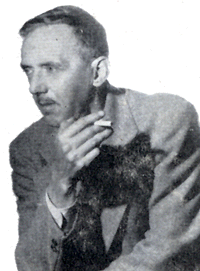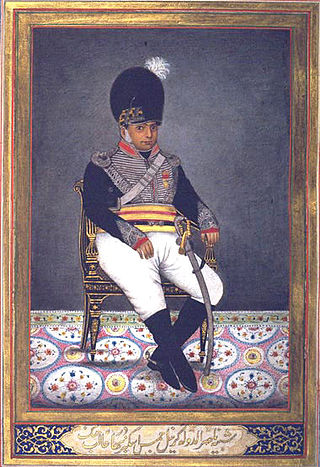
The 18th century lasted from 1 January 1701 to 31 December 1800 (MDCCC). During the 18th century, elements of Enlightenment thinking culminated in the Atlantic Revolutions. Revolutions began to challenge the legitimacy of monarchical and aristocratic power structures. The Industrial Revolution began during mid-century, leading to radical changes in human society and the environment. The European colonization of the Americas and other parts of the world intensified and associated mass migrations of people grew in size as part of the Age of Sail. During the century, slave trading expanded across the shores of the Atlantic Ocean, while declining in Russia and China.

William Makepeace Thackeray was an English novelist and illustrator. He is known for his satirical works, particularly his 1847–1848 novel Vanity Fair, a panoramic portrait of British society, and the 1844 novel The Luck of Barry Lyndon, which was adapted for a 1975 film by Stanley Kubrick.

William Clark Styron Jr. was an American novelist and essayist who won major literary awards for his work.

Henry Thomas Colebrooke FRS FRSE FLS was an English orientalist and botanist. He has been described as "the first great Sanskrit scholar in Europe".

The governor-general of India was the representative of the monarch of the United Kingdom in their capacity as the Emperor/Empress of India and after Indian independence in 1947, the representative of the Monarch of India. The office was created in 1773, with the title of Governor-General of the Presidency of Fort William. The officer had direct control only over his presidency but supervised other East India Company officials in India. Complete authority over all of British territory in the Indian subcontinent was granted in 1833, and the official came to be known as the "Governor-General of India".

Sir John William Kaye was a British military historian, civil servant and army officer in India. His major works on military history include a three-volume work on The History of the Sepoy War in India. This work was revised later by George Bruce Malleson and published in six volumes in 1890 as Kaye and Malleson's History of the Indian Mutiny.

Mulk Raj Anand was an Indian writer in English, recognised for his depiction of the lives of the poorer class in the traditional Indian society. One of the pioneers of Indo-Anglian fiction, he, together with R. K. Narayan, Ahmad Ali and Raja Rao, was one of the first India-based writers in English to gain an International readership. Anand is admired for his novels and short stories, which have acquired the status of classics of modern Indian English literature; they are noted for their perceptive insight into the lives of the oppressed and for their analysis of impoverishment, exploitation and misfortune. He became known for his protest novel Untouchable (1935), which was followed by other works on the Indian poor such as Coolie (1936) and Two Leaves and a Bud (1937). He is also noted for being among the first writers to incorporate Punjabi and Hindustani idioms into English, and was a recipient of the civilian honour of the Padma Bhushan, the third-highest civilian award in the Republic of India.

Ruth Prawer Jhabvala was a British and American novelist and screenwriter. She is best known for her collaboration with Merchant Ivory Productions, made up of film director James Ivory and producer Ismail Merchant.

William Arnold Ridley, OBE was an English playwright and actor, earlier in his career known for writing the play The Ghost Train and later in life in the British television sitcom Dad's Army (1968–1977) as the elderly bumbling Private Godfrey, as well as in spin-offs including the feature film version and the stage production.

Tom Brown's School Days is a novel by Thomas Hughes, published in 1857. The story is set in the 1830s at Rugby School, an English public school. Hughes attended Rugby School from 1834 to 1842.

Paul Mark Scott was an English novelist best known for his tetralogy The Raj Quartet. In the last years of his life, his novel Staying On won the Booker Prize (1977). The series of books was dramatised by Granada Television during the 1980s and won Scott the public and critical acclaim that he had not received during his lifetime.

Lieutenant-Colonel James Tod was an officer of the British East India Company and an Oriental scholar. He combined his official role and his amateur interests to create a series of works about the history and geography of India, and in particular the area then known as Rajputana that corresponds to the present day state of Rajasthan, and which Tod referred to as Rajast'han.

Robert Orme was a British historian of India. Son of a British East India Company physician and surgeon, he entered the service of the Company in Bengal in 1743. He was regarded as an authority on India.

Harold Lenoir Davis, also known as H. L. Davis, was an American novelist and poet. A native of Oregon, he won the Pulitzer Prize for his novel Honey in the Horn, the only Pulitzer Prize for Literature given to a native Oregonian. Later living in California and Texas, he also wrote short stories for magazines such as The Saturday Evening Post.
Hodder & Stoughton is a British publishing house, now an imprint of Hachette.
William Delafield Arnold was a British author and colonial administrator.

Colonel James Skinner was an Anglo-Indian military adventurer and soldier of the East India Company of British India. Prior to this he also served briefly as a mercenary in the Maratha Army. He became known as Sikandar Sahib later in life and is most known for two cavalry regiments he raised for the British at Hansi in 1803, known as 1st Skinner's Horse and 3rd Skinner's Horse, which are still units of the Indian Army.

Lieutenant-General John Wimburn Laurie, was a soldier and political figure in Nova Scotia, Canada for thirty years and then returned to England.
Ramsay Weston Phipps was an Irish-born military historian and officer in Queen Victoria's Royal Artillery. The son of Pownoll Phipps, an officer of the British East India Company's army, he was descended from the early settlers of the West Indies; many generations had served in the British, and the English military. Phipps served in the Crimean War, had a stint of duty at Malta, and helped to repress the Fenian uprising in Canada in 1866.
D Goonetilleke, "Forgotten Nineteenth-century Fiction: William Arnold's Oakfield and William Knighton's Forest Life in Ceylon" The Journal of Commonwealth Literature 7 (1972): 14-21.
















